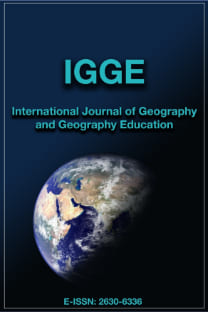ENERJİ COĞRAFYASI AÇISINDAN BİR İNCELEME: BİYOKÜTLE ENERJİSİNİN DÜNYADAKİ VE TÜRKİYE’DEKİ KULLANIM DURUMU
ÖZETDünyadaki nüfus artışı ve gelişen teknolojiyle beraber enerjiye olan gereksinim günden güne artmaktadır. Son yıllarda dünya enerji gündeminde ağırlıklı bir yer işgal eden belli başlı konular olarak enerji verimliliği, alternatif yakıt seçeneklerinin uygulanabilirliği, yenilenebilir enerji kaynakları, enerji kullanımının yol açtığı çevre sorunları için aranan ve üretilen çözümler sayılabilir. Yukarıda sayılan bütün konularla ilgili olan ve günümüz enerji kullanımında giderek kendine önemli bir yer edinen biyokütle enerjisi; sürdürülebilir kalkınma, çevre duyarlılığı ve enerji verimliliği kapsamında değerlendirilmeye uygun potansiyeli ile öne çıkmaktadır. Biyokütle; sürdürülebilirlik, kolaylıkla bulunabilirlik ve çevre üzerinde istenmeyen etkiye sebep olmama gibi bazı önemli avantajlara sahip olan yenilenebilir bir enerji kaynağıdır. Biyokütle enerjisi çevre ile dost sürdürülebilir enerji üretimini ve çevre yönetimini sağlayan, kalkınmayı hedefleyen özellikleri ile tüm dünyada geniş bir uygulama alanı bulmuştur. Bu sebeple Dünya’da ve Türkiye’de biyokütlenin enerji üretiminde değerlendirilmesi konusu önem kazanmıştır.Anahtar kelimeler: Enerji Kaynakları, Yenilenebilir Enerji, BiyokütleABSTRACTEnergy need has been increasing day by day with population increase and developing technologies. In recent years, among the certain topics occupying the world energy agenda are energy efficiency, the applicability of the alternative fuel options, renewable energy resources, the solutions sought and produced for the environmental issues stemming from the energy use. The biomass energy that is related with all the issues mentioned above and that has gained a significant place for itself in today’s energy use has become prominent with the significant advantages it has such as sustainable development, environmental awareness and its grand potential to be evaluated within the context of energy efficiency.Biomass is a renewable energy source that has some important advantages as sustainability, accessibility and do not having undesirable effect on environment. Biomass energy has found great opportunities for being environmentally friendly sustainable energy source, providing safe environmental management and targeting development throughout the world. For this reason, utilization of biomass energy has gained importance as an energy source in The World and Turkey.Keywords: Energy Resource, Renewable Energy, Biomass
Anahtar Kelimeler:
Enerji Kaynakları, Yenilenebilir Enerji, Biyokütle
-
Energy need has been increasing day by day with population increase and developing technologies. In recent years, among the certain topics occupying the world energy agenda are energy efficiency, the applicability of the alternative fuel options, renewable energy resources, the solutions sought and produced for the environmental issues stemming from the energy use. The biomass energy that is related with all the issues mentioned above and that has gained a significant place for itself in today’s energy use has become prominent with the significant advantages it has such as sustainable development, environmental awareness and its grand potential to be evaluated within the context of energy efficiency. Biomass is a renewable energy source that has some important advantages as sustainability, accessibility and do not having undesirable effect on environment. Biomass energy has found great opportunities for being environmentally friendly sustainable energy source, providing safe environmental management and targeting development throughout the world. For this reason, utilization of biomass energy has gained importance as an energy source in The World and Turkey.
Keywords:
Energy Resource, Renewable Energy, Biomass,
___
- Acaroğlu, M. (2008). “Türkiye’de Biyokütle-Biyoetanol ve Biyomotorin Kaynakları ve Biyoyakıt Enerjisinin Geleceği”, VII. Ulusal Temiz Enerji Sempozyumu (UTES’2008), 17-19 Aralık 2008, Sayfa:351-362, İstanbul.
- Ahiler Kalkınma Ajansı (AKA). “Güneş Enerji Sektörü (GES)”, http://www.ahi-ka.org.tr/upload/pdf/ihale ilanlari/ihracatrapor/gunes_enerji_rapor.pdf, (E.T: 02014).
- Alemdağ, İ. S. (1980). “Manual of Data Collection and Processing for the Development of Forest Biomass Relationships”, Petawawa National Forest Institute, Canadian Forest Service, Information Report PI-X-4, p.38.
- Anonim 2011a. “Youth for Habitat Türkiye, Sürdürülebilir Enerji Eğitimi Kitapları”, Biyokütle Enerjisi, http://www.habitaticingenclik.org.tr/dl/yayinlar/enerji/BiyoK utle.pdf (E.T: 01.04.2014).
- Anonim 2011b. “Diğer Enerji Kaynakları Tanımı ve Kaynakların Ülkemizdeki Mevcut Durumu”, Biyokütle Enerjisi, http://www.angelfire.com/scifi/nuclear220/sec555.htm#BİY OKÜTLE%20ENERJİSİ (E.T:02.04.2014).
- Anonim 2011c. “Biyokütle Çevrim Teknolojileri”, http://www.anadolutayfasi.net/kimya/54694biyotuklecevrim-eknolojileri.html, (E.T: 03.04.2014).
- Ateş, F. (2004). “Biokütlenin Sabit Yatak Pirolizine Katalizörün Etkisi”, V. Ulusal Temiz Enerji Sempozyumu Bildiri Kitabı, Sayfa: 467-474, 26-28 Mayıs 2004, İstanbul.
- Balat, M. (2005). “Use Of Biomass Sources For Energy In Turkey And A View To Biomass Potential”, Biomass and Bioenergy, Sayı: 29(2005, ) s. 32-41.
- Boztepe E. ve Karaca A. (2009). “Yenilenebilir Enerji Kaynağı Olarak Tarımsal Atıklar”, Türkiye 11. Enerji Kongresi ve Sergisi, 21-23 Ekim 2009, İzmir.
- Bölük G. ve Koç A. A. (2008). “Dünya’da ve Türkiye’de Biyo-yakıtlar: Üretim, Politikalar, Maliyet ve Etkileri” (Biofuels in the World and Turkey: Production, Policies, Cost and Impacts], İktisat, İşletme ve Finans Dergisi, Volume: 23, Sayı: 269, Sayfa: 25-50.
- Dünya Enerji Konseyi Türk Milli Komitesi (DEK-TMK), (Aralık 2012). “Enerji Raporu 2012”, http://www.dektmk.org.tr/upresimler/enerjirapor2012.pdf, (E.T: 03.03.2014).
- Enerji ve Tabii Kaynaklar Bakanlığı (ETKB), (2010). “Enerji ve Tabii Kaynaklar Bakanlığı 2010-2014 Stratejik Planı”, http://www.enerji.gov.tr/yayinlar_ raporlar/ ETKB_2010_2014_Stratejik_Plani.pdf, (E.T: 14 Mart 2014). Enerji ve Tabii Kaynaklar Bakanlığı (ETKB). “Mavi Kitap 2013”, Enerji Tabii ve Kaynaklar Bakanlığı ile Bağlı ve İlgili Kuruluşlarının Amaç ve Faaliyetleri, Ankara. http://www.enerji.gov.tr/yayinlar_raporlar/Mavi_Kitap_2013. pdf (E.T: 02.02.2014).
- Enerji ve Tabii Kaynaklar Bakanlığı (ETKB). (2013), “Türkiye Kasım Ayı Enerji İstatistikleri-11”, Enerji İstatistikleri Daire Başkanlığı. Ankara. http://www.enerji.gov.tr/yayinlar_raporlar/Enerji_Istatistik_R aporu_Aylik/2013_11_Enerji_Istatistikleri_Raporu.pdf (E.T: 002014).
- Hall, D.O. (1997). “Biomass Energy in Industrialized Countries-A”, View of the Future For Ecol Manag., 91 p:17-45.
- İlleez B. (2004). “Güneş Enerjisi Destekli Sürekli Beslemeli Tip Biogaz Üretecinin Oluşturulması‟‟ Yüksek Lisans Tezi, Ege Üniversitesi, Güneş Enerjisi Enstitüsü, Güneş Enerjisi A.B.D, İzmir.
- Irternational Energy Agency (IEA) (2012). “World Energy Outlook (WEO) Executive
- Yayın Aralığı: Yılda 3 Sayı
- Başlangıç: 1996
- Yayıncı: Marmara Üniversitesi
Sayıdaki Diğer Makaleler
COĞRAFYA BÖLÜMÜ ÖĞRENCİLERİNİN PORTFOLYO DEĞERLENDİRMEYE İLİŞKİN GÖRÜŞLERİ
TÜRKİYE'DE MÜLKİ İDARİ TAKSİMATA İLİŞKİN YASAL MEVZUATIN DEĞERLENDİRİLMESİ VE SORUNLAR
A BRIEF LOOK AT GENERAL AND ENVIRONMENTAL EDUCATION IN NIGERIA
ENDÜSTRİ ALANI DÖNÜŞÜM PROJESİ SEKAPARK’IN (KOCAELİ-İZMİT) KIYI KULLANIMINA ETKİSİ
İDARİ VE BÖLGESEL COĞRAFYA PERSPEKTİFİNDEN BELARUS CUMHURİYETİ
Emin ATASOY, Elena GALAI, Ordenbek MAZBAYEV
FRANSIZ AKÇAAĞACI (Acer monspessulanum subsp. monspessulanum)'NIN TÜRKİYE'DE YENİ BİR YAYILIŞ ALANI
